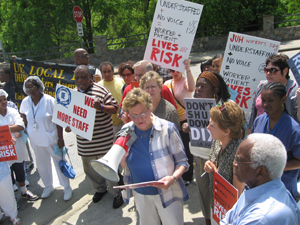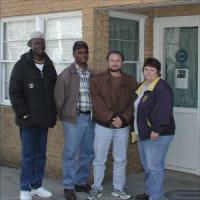
Beverly Moriarty (center, with bullhorn), RN at Dorothea Dix Hospital, speaks about the devastation that the planned closing of Dix will have. State Sen. Vernon Malone (lower right) attended the rally to show support for the concerns of the protesters.
The Dorothea Dix Hospital in Raleigh remains in turmoil. As we edge closer to the closing date presently set for July 1, 2008, we have stirred up a momentum not seen since our earliest struggles. The issues here are the same as those in other statewide facilities, but with the closure looming, the stress level is compounded. On Friday April 25 we held a rally in front of the hospital covered by media to restate the urgency of saving Dix and bring to the attention of the community that we as dedicated front line workers are standing up to defend our jobs as committed workers serving our patients honorably. We are underpaid and underappreciated and have been placed in harm’s way with the ever increasing reductions of staffing. The loss of core staffing places greater demands on remaining staff to fill the gap. Not only do we use our dots, but on those days and nights when the staffing levels are dangerously low, we have to mandate that anyone not working more than 8 hours has to remain to satisfy the staffing needs. It only makes the workers more demoralized and fatigued. The problem is only worsening.
We are pleading with the powers that be to consider the safely issues that will be created by attempting to transition to Central Regional Hospital too quickly. There has been enough negative media attention on safety and we don’t need more. It was brought out that the hospital has been a resource in the community for 150 years. It has served the most vulnerable, the sickest and the poorest of our severely mentally ill. It has been there as a comfort to those who love their sick family members and it has provided jobs to workers like housekeepers, kitchen aids, grounds keepers and healthcare tech. The closing of this hospital will most severely negatively impact these individuals. And these individuals are disproportionately our black citizens. I ask if this will be our mini Katrina. Our legislators need to think carefully and move forward with caution before the situation is irreversible. We need to open Central Regional BEFORE closing Dix, which is functioning and is providing service to its community.
On May 2 we had a second rally with Senator Vernon Malone supporting our efforts to protect Dix. We showed our solidarity to save the hospital, address the unsafe staffing and to address the serious injuries sustained by our front line workers. We asked that he respond to our proposal to meet with us again and to encourage other legislators and community leaders to attend our weekly rallies. We asked that he encourage others to attend our Mental Health Workers Bill of Rights Public Hearing Thursday May 29 in Raleigh.




